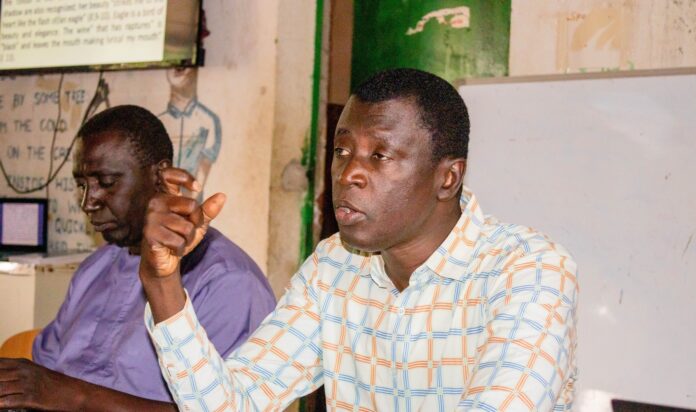By: Dawda Baldeh
It has been exactly five months since the Minister of Basic and Secondary Education, Haddy Jatou Sey, resigned from her role over a dual citizenship controversy. Since then, the ministerial position has remained vacant, raising concerns about the delays in appointing a new minister to lead this crucial sector.
Speaking in an exclusive interview with The Fatu Network, Ismaila Ceesay, the President of The Gambia Teachers’ Union (GTU), urged the government to expedite the process of appointing a new minister. He warned that the prolonged vacancy has had significant negative consequences for the country’s most vital sector.
According to Mr. Ceesay, the absence of a minister compromises the ministry’s ability to secure necessary funding and support.
“The absence of a minister means there is no dedicated advocate to highlight the needs and priorities of the education sector,” he explained, adding that the situation affects the ministry’s budget, as it may not receive the level of attention or understanding required by the cabinet. This could result in inadequate funding for essential programs.
For Mr. Ceesay, a minister’s appointment would ensure the ministry’s proposals are adequately defended before the cabinet.
“Without this representation, critical budget items may be overlooked or dismissed without thorough justification, potentially leading to funding reductions in essential areas or misalignments with the ministry’s strategic priorities,” he emphasized.
Custodianship of Regulations and Policy Development
The GTU President reiterated the critical role a minister plays in safeguarding educational regulations and policies.
Policy Communication:
“The recent completion of the Midterm Policy Review highlights the importance of ministerial input in shaping policy decisions. The lack of leadership in this area hampers the effective communication of insights and expertise necessary for implementing policy changes, resulting in difficulties in aligning the ministry’s vision with revised policies,” he said.
Strategic Direction:
Mr. Ceesay explained that the void created by the absence of an authoritative figure weakens the strategic direction of the ministry. This affects stakeholders and educational institutions striving to align their objectives with the ministry’s goals.
Role in Budget Development
He also highlighted the crucial role of the minister in the budget development process, including:
Prioritization of Needs:
“The minister typically identifies and prioritizes the needs within the education sector. Without their guidance, inconsistencies may arise in budget allocations, leading to the potential underfunding of critical areas. The presentation of the education budget in the cabinet, currently handled through an intermediary, may further result in inadequate outcomes,” he noted.
Reforms in Basic and Secondary Education
Mr. Ceesay noted that recent updates to the education policy necessitate urgent revisions to the strategic plan, incorporating new inclusions such as:
- Education in Emergencies and ICT in Education to mitigate the impact of COVID-19
- Mainstreaming Education Intervention Strategies in Schools (MEISS)
- Foundational learning strategies
- The new scheme of service
“These developments require immediate political leadership and guidance for effective implementation. Without this, efforts to address educational needs may become fragmented, causing serious implementation gaps,” he explained.
For him, the absence of a duly appointed minister for basic and secondary education creates significant challenges that impede progress across various strategic reforms and initiatives. These include securing the needed budgetary support for the ministry.
“The absence of a minister is not a positive indication at all from the government, considering MoBSE as the biggest sector in the country,” he said. “Honestly, it is unfortunate that the sector is without an appointed minister.” He advised the president to urgently appoint a new minister for basic and secondary education.
Impact on Teachers and Students
Mr. Ceesay highlighted that the recruitment, training, and retention of teachers often depend on the leadership and vision of the education minister.
“The absence of these can lead to a lack of strategic direction, leaving existing educators feeling unsupported, which could result in morale issues and increased turnover rates,” he emphasized.
He concluded that appointing a new minister is urgently needed to oversee adherence to national standards and ensure accountability measures for schools.
“Without this oversight, there may be inconsistencies in educational quality, curriculum delivery, and performance assessment,” he added.




